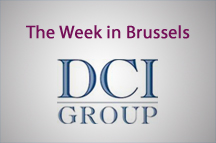 This week was a plenary session in the European Parliament in Brussels, but in reality there was only one vote that anyone wanted to talk about and it wasn’t the Convention on Mutual Assistance and Cooperation between Customs Administrations. Yes, the UK referendum continues to dominate the EU agenda.
This week was a plenary session in the European Parliament in Brussels, but in reality there was only one vote that anyone wanted to talk about and it wasn’t the Convention on Mutual Assistance and Cooperation between Customs Administrations. Yes, the UK referendum continues to dominate the EU agenda.
As the week got underway, Brussels was filled with confident EU officials proclaiming that the referendum was all but over. President Obama’s robust, and potentially decisive, intervention during his visit to the UK had sealed the deal.
The sunny optimism obviously affected some, to the point that they decided perhaps it would be more interesting to make the referendum a fair fight. On Thursday, the Commission announced that it would launch infringement proceedings against the UK, because of the HGV levy imposed by the UK Government on non-UK vehicles. EU courts dictating to Britain that we can’t charge foreign lorries who come over here and use our roads? It was a free hit, and the Eurosceptic press duly took a big swing at it. For a European Commission that had proudly declared it would be more ‘political’, this was an embarrassing mis-step that handed an easy win to the Brexiteers. Was there really no-one prepared to suggest that this might be best left in a drawer until, say, June 24th?
 Obama, though, had more than Brexit on his mind. His speech in Hanover was welcomed for its endorsement of European unity and values – but he also spent time chiding European leaders on defence and security. His message that EU countries need to take seriously the responsibility for their own internal and external security – “We need a strong Europe to bear its share of the burden” - was neither a soft nor subtle rebuke of decades of European policy set in Brussels and major EU capitals.
Obama, though, had more than Brexit on his mind. His speech in Hanover was welcomed for its endorsement of European unity and values – but he also spent time chiding European leaders on defence and security. His message that EU countries need to take seriously the responsibility for their own internal and external security – “We need a strong Europe to bear its share of the burden” - was neither a soft nor subtle rebuke of decades of European policy set in Brussels and major EU capitals.
Obama’s speech painted a broad vision of those security responsibilities, critiquing some of the most controversial legislative and regulatory issues in EU politics – privacy, surveillance, and migration. Those debates will still be rumbling in the corridors of power in Brussels long after the Brexit question has been settled.
Obama was not alone on focusing on European security, this week. Donald Trump’s much-trailed major foreign policy speech put forth his view on Europe’s security and defence policy, which amounted to Europeans either footing the bill for U.S. defence commitments, or doing without them. Whether the warnings from either Obama or Trump will be heeded is another matter entirely.
MEPs left Brussels having voted through a new Railway Package, aimed at liberalizing Europe’s passenger railway markets (as well as the aforementioned customs cooperation convention). Obama probably left Europe with more questions than answers: will the Brits listen to his entreaties to stay in the European Union? Will the EU itself listen to his warnings on the need to step up on security? And perhaps the most disconcerting question of all - within a matter of months, will we all be forced to listen to President Trump?














